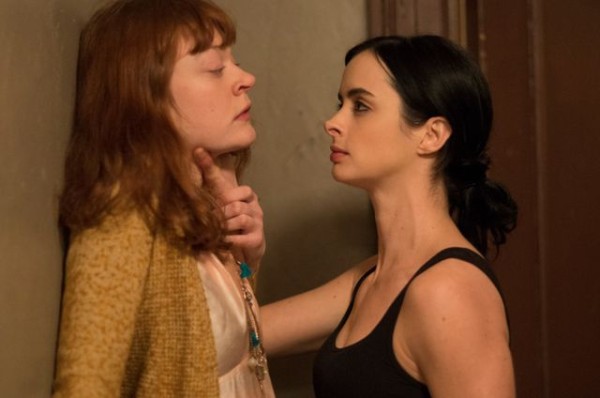
Courtesy of Netflix
After the success of Netflix and Marvel’s first collaboration, Daredevil, it’s time to see if lightning strikes twice. Let’s binge the first two episodes of Jessica Jones.
Let’s bitch it out…
1×01 ‘AKA Ladies Night’
The series premieres in a very self-assured fashion. As written by (TV) creator Melissa Rosenberg, ‘AKA Ladies Night’ does a great job laying the foundation for the narrative to come while also establishing the visual aesthetic that future episodes try to emulate. The neo-noir vibe is on full display throughout the opening episode, which thankfully is the only time that Jessica Jones (Krysten Ritter) pontificates in voice-over (at least through the first four episodes).
The most vital component of the premiere is its pervasive sense of mystery. Jessica’s work for cold, calculating lawyer Jeri Hogarth (Carrie-Anne Moss) is effectively our introduction to Jessica’s dual worlds: her capacity as a private investigator, and her super strength “gift”. The real core of the episode (and series) comes out of the routine case of the week, which arrives in the form of Barbara and Bob, the worried parents of track star Hope (Erin Moriarty) who has gone MIA. As Jessica investigates, we slowly get to know the cast of characters populating the dark and neon-infused world. For each connection, a mystery emerges, prompting questions that demand answers, including:
- What happened between Jessica and Trish Walker (Rachael Taylor), the host of Trish Talks, whom Jessica hasn’t spoken to in six months?
- Why does Jessica cry when she sees the picture of Luke Cage’s (Mike Colter) ex, Reva Connors (Parisa Fitz-Henley), in the medicine cabinet?
- Who is the mystery man in purple (David Tennant) who haunts Jessica’s dreams, driving her to drink and work throughout the night?
By establishing itself as a series of questions with few answers, ‘AKA Ladies Night’ kicks off Marvel’s Jessica Jones with a lot of promise and a dynamic performance by lead Ritter. It’s a good, confident start.
Other Observations:
- Voyeurism is another recurring / pervasive component of the episode. We frequently see Jessica through windows and doorways, which plays into Jessica’s line of work and her feelings of being stalked by Kilgrave.
- When Jessica realizes who she’s dealing with at the restaurant, the camera work immediately reflects her point of view, becoming erratic and jumpy. It’s the single most showy moment of the first episode, but it works because it is so jarring compared to what we’ve seen.
- Do we care that married Jeri is sleeping with her assistant Pam (Susie Abromeit)? Is this a legitimate plot point?
- $10 says that Jessica’s neighbour Malcolm (Eka Darville from The Originals) doesn’t survive the series. Kilgrave is gonna make this dazed junkie do something terrible to himself for sure.
- Obviously that closing scene in the elevator: quite the humdinger. Just in case you weren’t planning on playing the next episode, right?

Courtesy of Netflix
1×02 ‘AKA Crush Syndrome’
With the events of the elevator firmly fixed in ours (and Jessica’s mind), the run-of-the-mill case launches the series full throttle into an investigation into Kilgrave. While Hope’s confession at the prison, including blaming Jessica and encouraging her to kill herself, comes off a touch too expository and leaden, her comment about being made to jump as high as she could for hours is suitably icky and invasive.
If the first episode were mostly about allowing us into this world, the second is more perfunctory: it’s all about the rote machinery of Jessica’s investigation, which provides us context for how things ended with Kilgrave, but also produce an episode that feels like a letdown compared to the premiere. Jessica investigates Kilgrave’s accident, following up on minor details to track him from the hospital to the missing ambulance to Jack, the EMT, whose kidney Kilgrave stole and has left living out his days on a dialysis machine. This, in turn, brings her to frightened Dr. Keratta, a former surgeon in hiding as a lacklustre college instructor, who confirms Kilgrave’s existence to Jeri, and – most importantly – reveals Kilgrave’s weakness is surgical anesthetic.
Aside from the details of the case, the episode digs a little more deeply into Jessica’s relationship with Trish and Luke. The former is Jessica’s (former?) best friend, but Trish clearly has mommy issues that also encourage her to protect Jessica. Luke, on the other hand, clearly doesn’t need any protection: as the bar attack scene (the episode’s best action sequence) demonstrates, he’s indestructible. This likely isn’t a surprise to fans of the comics, but a fun – and slightly grotty – reveal for casual viewers.
Other Observations:
- Trish doesn’t need protection because she has been taking self-defence classes in the interim (hence the bruises on her arms that her assistant makes her hide).
- ‘AKA Crush Syndrome’ offers us our first real glimpse of Tennant as Kilgrave when he invites himself to stay with a rich family in a high-rise. The scene doesn’t really exist for any other reason than to reinforce what he’s capable of and how little disregard he has for his victims. The casual nature with which he orders the young kids into the closet is upsetting despite featuring no violence or bloodshed.
- Finally, this episode introduces the upstairs neighbours interferring with Jessica’s sleeping and they’re comically obnoxious (and maybe perverted). Much like Jeri’s philandering in the premiere, do we really care about these two, even if Ruben (Kieran Mulcare) is clearly intended to be some kind of weak comic relief/love interest? Pass.
Your turn: what did you think of the first two episodes? Are you hooked or do you prefer Daredevil? Is Krysten Ritter believable as a damaged superhero? Do you like her chemistry with Colter’s Luke Cage? Wish there was more Tennant? Like the neo-noir vibe? Sound off below.
Marvel’s Jessica Jones is now available in its entirety on Netflix. Check back Thursday for our binge review of episodes three and four.